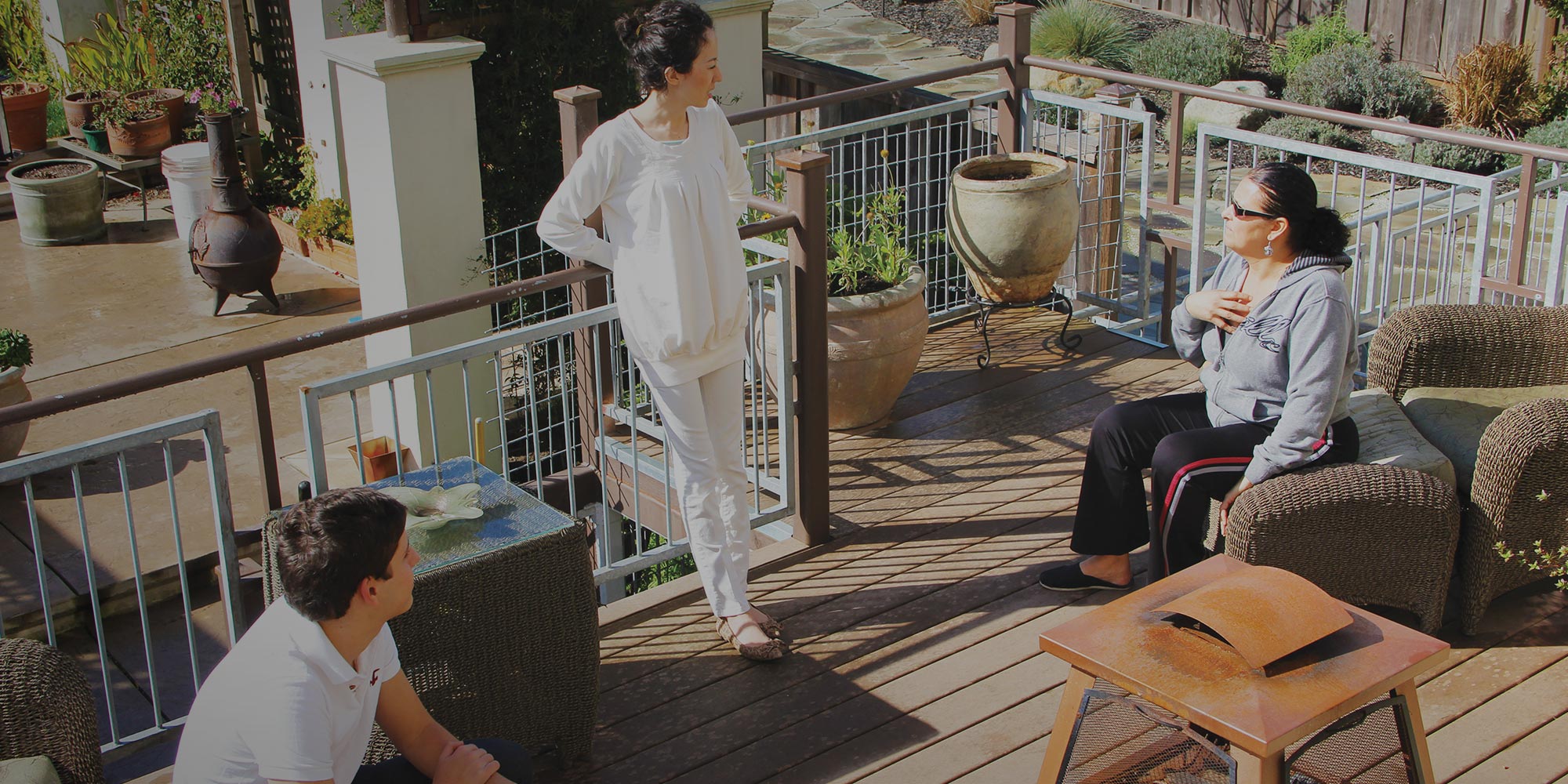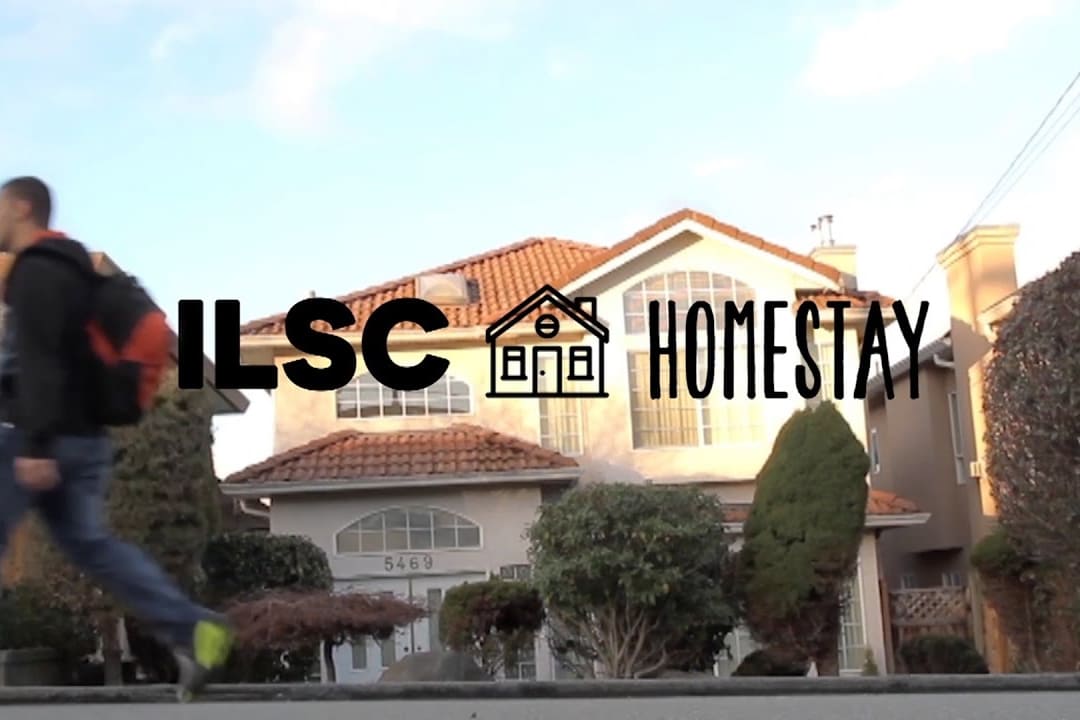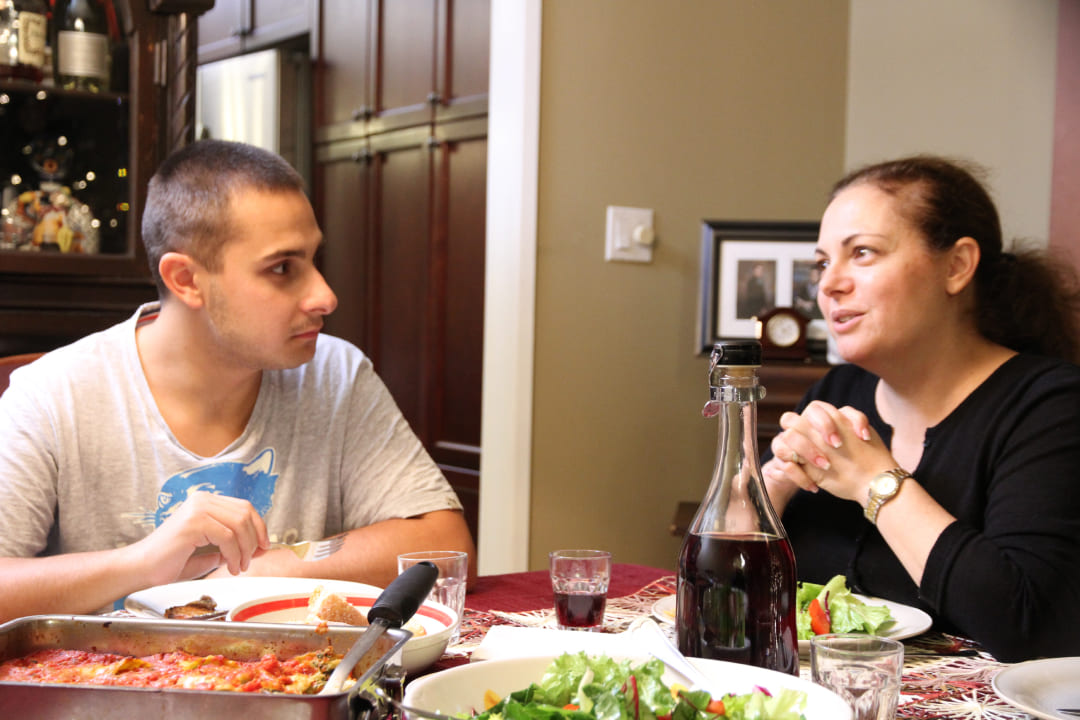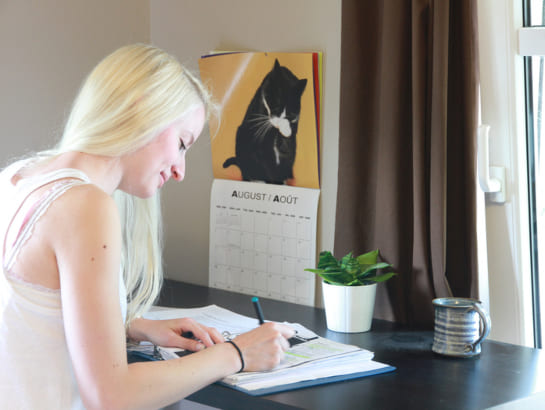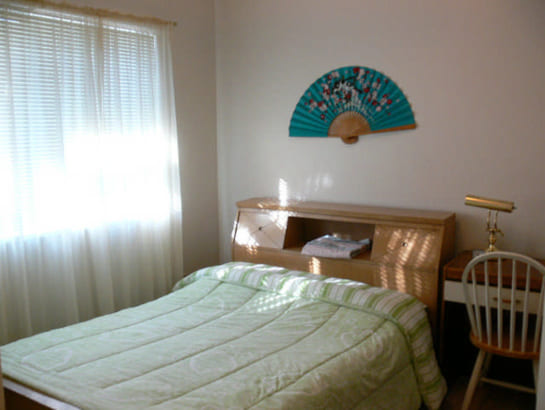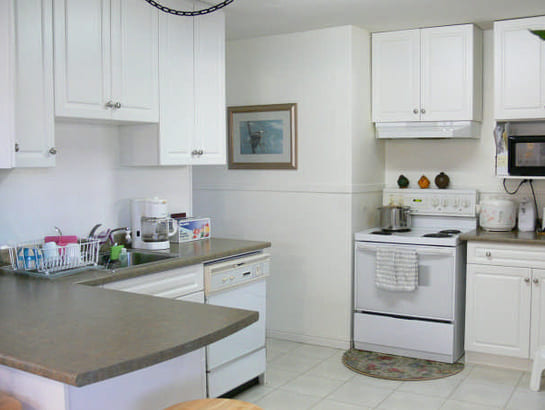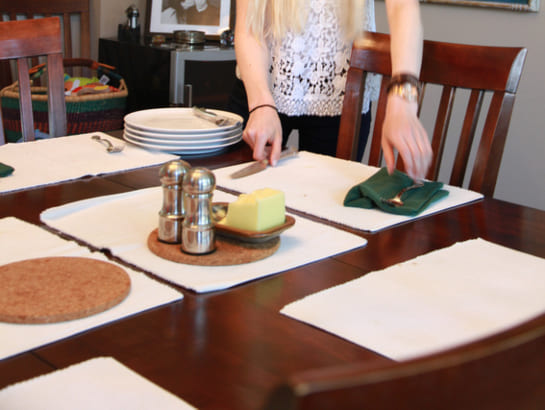Our homestay option provides half-board on weekdays, full board on weekends meal plan and three room types (standard, twin room, executive) in a supported environment with an Irish family in Dublin.
All prices are in Euro (EUR). Taxes are included where applicable. Rates are per person. Booking is subject to availability.
All ILSC Dublin homestay bookings require an Administration Fee of €75 in addition to weekly fees. Pricing is valid for arrivals in 2025 but is subject to change at any time.
For special diets, please inquire about availability - if available special diets are an additional $35/week. Special diet surcharge include:
- Halal
- Kosher
- Vegetarian
High season pricing applies from the night of June 15 to the night of August 31, 2025 inclusive, based on the dates of your stay
Twin Room*
(Shared Bathroom)
Enjoy a homestay in a shared room for a more communal living experience.
 BREAKFAST
BREAKFAST LUNCH (weekends only)
LUNCH (weekends only) DINNER
DINNER
- WEEKLY RATE FOR 16+
- €250
- HIGH SEASON SUPPLEMENT
- €35
*Twin Room can only be booked by two friends coming together and studying at ILSC Dublin on the same dates and for the same duration.
Standard Single
(Shared Bathroom)
Experience a homestay in a private single room with a shared bathroom.
 BREAKFAST
BREAKFAST LUNCH (weekends only)
LUNCH (weekends only) DINNER
DINNER
- WEEKLY RATE FOR 16+
- €300
- HIGH SEASON SUPPLEMENT
- €35
Executive
(Single room en-suite)
Stay in a homestay with a private ensuite room for added comfort and privacy.
 BREAKFAST
BREAKFAST LUNCH (weekend only)
LUNCH (weekend only) DINNER
DINNER
- WEEKLY RATE FOR 16+
- €395
- HIGH SEASON SUPPLEMENT
- €35
Practical Tips for Homestay Students
Welcome to Your Homestay
- Your host family provides a safe and friendly home. They will help you adjust to life in Ireland and guide you when needed.
- Respect and understanding are important for a good homestay experience
Before You Arrive
- You may contact your host family before arriving by email or WhatsApp. They may also contact you.
- When you get an Irish mobile number, share it with your host family as soon as possible.
Living with Your Homestay Family
- Homestay families come from different backgrounds, cultures, and religions. ILSC is a welcoming and inclusive space for everyone.
- You may live with other students from your country, but you should speak English at all times.
- Your homestay family is kind and understanding. It is normal to feel nervous at first, but you will feel more comfortable when you get to know the family better. Please give yourself a few weeks to settle.
- Some hosts prefer to be called by their first name, while others may ask you to call them "Mum" or "Dad."
- Be polite! Say things like "Thank you," "Good morning," "Hi, how are you?" and "Bye, I’m going out, but I’ll be back for dinner."
- If you spend too much time in your room, your host may think you are unhappy. Spend time talking with them, watching TV, or helping with small tasks
- Every homestay has house rules. Your family will explain them on your first day. Try your best to follow them.
- If you have questions about your homestay payment, please speak to the Accommodations Team - not your host. Hosts are not involved in payment matters.
- Ireland has a mild, damp climate, with frequent rain year-round. Bring a good waterproof jacket and layers to stay warm and dry.
- Seasonal allergies like hay fever can be common in spring and summer. If you’re prone to allergies, bring any necessary medications.
- Irish homes may feel different from what you're used to. Many houses are older, with varied insulation and heating systems. It's normal to feel a bit chilly indoors—warm clothing and cozy layers help!
- Your homestay offers a balance of independence and support. Irish hosts are friendly and informal. You’ll be encouraged to make yourself at home, but also expected to communicate openly and respectfully.
- Life in Ireland tends to be relaxed and social. Tea and chat are part of daily life—don’t be shy about joining in!
- Always lock the front and back doors when leaving the house.
- Return your keys at the end of your homestay.
- If you damage something in the house, you will need to pay for repairs or replacements.
- Guests and overnight visitors are not allowed unless your host gives permission.
- Follow all safety instructions given by your homestay, especially around heating systems, kitchen use, or when exploring your local area.
- Ireland is a very safe country, but it’s still important to stay aware of your surroundings, especially in unfamiliar places or at night.
- Always inform your host family where you are going and when you will return.
- Your room will have a bed, wardrobe, study desk, and chair. You will also receive bed linen and a towel.
- You must buy your own personal care items, such as shampoo, toothpaste, and soap.
- Most bedrooms do not have locks. Keep your valuables safe.
- Keep your room clean and tidy.
- Bedrooms are private spaces. Knock before entering someone else's room.
- Heating and cooling devices may be available. Ask your host about using them. Remember to use them moderately, turning them off when not in use or before going to bed.
- Turn off the lights when leaving a room or going to sleep.
- Talk to your host if you need space for your luggage.
- Be quiet after 10:00 pm. Most Irish go to bed early. If you need to call family in your country, ask your host about a good time.
- You can stay up late if you are quiet and do not disturb others.
- Clean up after yourself in common areas.
- Helping with small tasks is a nice way to show respect to your host family.
- Your homestay provides half-board meals (breakfast and dinner every day, plus a light lunch on weekends if requested).
- Breakfast is usually simple: toast, coffee, yogurt, or cereal. Most families do not eat breakfast together.
- Weekend lunch is usually a light meal, like a sandwich or a reheated dishes/leftover from the previous day’s dinner.
- Dinner is a hot meal, usually prepared by the parents. Families often eat together. This is a great time to practice your English!
- Your host will tell you what time dinner is served. If you will be late, let them know.
- If you cannot join the dinner, kindly let your host know beforehand. You may need to reheat the meal afterwards using the microwave.
- If your host is not home at dinner time, they will prepare your meal in advance.
- Weekday lunch is your responsibility. You also need to buy your own snacks.
- Ask your host where you can store your snacks.
- Many Irish families freeze and refrigerate food, like large portions of meat, bread and other produce to keep it fresh. This is normal and safe, and food from the freezer or fridge is not old.
- If you have food allergies or foods you cannot eat, tell your agent and host before arriving.
- After eating, wash your dishes or put them in the dishwasher, as guided by the host.
- Most Irish eat with a knife, fork, and spoon. Making noises like slurping or burping is considered rude.
- Always say “Thank you” to the person who prepares your meal.
- Do not eat food in your bedroom to avoid insects, smell, stains, food spills, and other mess.
- You are not allowed to cook unless your host gives you permission.
- You can use kitchen appliances like the microwave, toaster, fridge, and air fryer. Your host will show you how.
- Keep the kitchen clean.
- The bathroom is shared with other family members. Follow the rules your host gives you.
- Showers should take 5 to 7 minutes to save water. Your host will inform you about the specific times, durations, and frequencies for showering. Water conservation is important to our families, and they may limit the amount of water they use.
- Keep the bathroom floor dry.
- In Ireland, males should lift the toilet seat before urinating.
- Toilet paper must be flushed in the toilet. Do not throw it in the bin.
- Feminine hygiene products must be wrapped and placed in the bin, not flushed down the toilet.
- Always wash your hands after using the toilet.
- Your host will tell you when and how to do laundry, usually once a week.
- Some hosts do the laundry for you, while others will ask you to do your own.
- Do not hang wet clothes in your bedroom. Your host will show you where to dry them.
- Do not wash clothes in the shower.
- Homestays are usually in suburban areas, 40–60 minutes from school by public transport.
- Your host will explain the best way to travel and where to buy a travel card. You must pay for your own transport.
- In a medical emergency, if your host cannot provide transport to a doctor or hospital, you are responsible for emergency transport costs.
- Your homestay family will set your curfew, usually 8:00 pm on weekdays and 10:00 pm on weekends. Your homestay and school will give you your exact curfew time.
- You must sleep in your assigned homestay every night, including weekends. Travel to other cities is not allowed.
- Always inform your homestay family where you are going and when you will return.
- If you are going to be more than fifteen (15) minutes late for class, you must contact the ILSC Student Advisor Team of your campus to notify them.
- Share your phone number with your host and keep their number too.
- Failure to follow these rules will be reported to ILSC by your host. Violations may breach your visa conditions and result in expulsion from Ireland.
- Smoking or vaping is not allowed inside homestay houses. If you smoke, include this in your homestay application.
- If you are over 18, you must ask permission from your homestay parents before drinking alcohol at home. Some families allow it, while others do not.
- Never arrive home drunk.
- Violating homestay rules regarding smoking or alcohol may result in the termination of your homestay placement.
- Internet plans vary by homestay. Always check with your host about data limits before streaming or downloading content
- You may call your parents to let them know you have arrived safely, but always ask your host before using their telephone.
- Many families do not have landline phones. Instead, they use mobile phones. You can purchase an affordable mobile phone and SIM cards from local providers Three, Vodafone, Eir Mobile in Dublin City Centre. Some budget mobile service providers like Tesco, GoMo and others also sell SIM cards at supermarkets and convenience stores.
- If you do not have a mobile phone, you can reverse-charge a call, use a pay phone, or make an internet call.
- If you need to receive mail or parcels, ask your homestay family first. Some hosts allow students to use their address, while others do not.
- If your host does not allow mail delivery, you can use the school’s address for your packages.
- Many families have pets such as cats, dogs, birds, and/or rabbits. Cats and dogs are the most common.
- If you are allergic to or uncomfortable with animals, request a pet-free home in your homestay application. However, availability is limited, and priority is given to students with allergies.
- After arrival if you have any issues with the homestay please contact us with in the first 5 days.
- If you need to change your homestay, each request is assessed on a case-by-case basis.
- You may need to pay a homestay replacement fee.
- If you decide to leave, you must give two (2) weeks' notice to the Accommodation Team.
- If you leave without giving two weeks' notice, you must still pay 4 weeks of homestay fees unless otherwise agreed.
ILSC Accommodations Contact Numbers:
Phone: + 353 1 644 9742 (Monday-Friday 9am-5pm)
Emergency Services in Ireland:
Call “112” or "999" for police (Gardaí), ambulance, fire, and coast guard emergency services. Ireland has two numbers for emergency service, but both will connect you to the same services.
